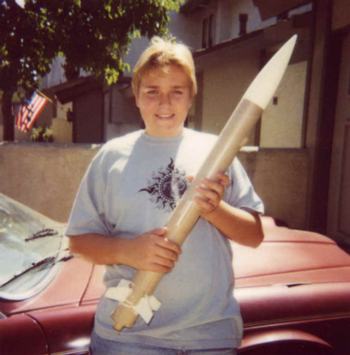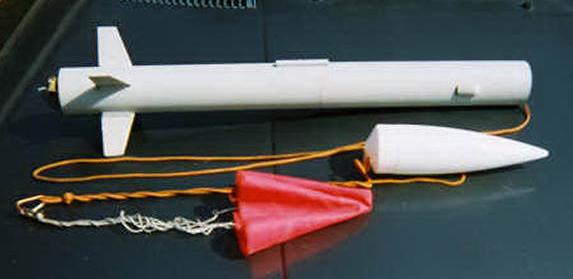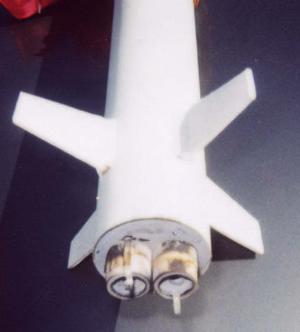| Diameter: | 2.60 inches |
| Manufacturer: | The Launch Pad  |
| Skill Level: | 3 |
| Style: | Scale |
Brief:
ASRAAM is a scale kit by The Launch Pad that models a prototype of a thrust-vectored air-to-air missile. As such, it sports a set of dinky fins that suggest not too much of a stability margin. In fact, ASRAAM is not only exceptionally stable in flight, but is an excellent, easy-building sport flyer, and a good choice for a first cluster model (it uses a pair of 24mm motors). Surprisingly, flight is acceptable with only a single D12 firing, and this further recommends ASRAAM as a "starter" cluster model.
Construction:
The model construction is straight-forward, 4FNC. I decided from to outset to build it as a sport-flyer rather than scale, so I made a number of changes, the main one being to extend the 24 mm motor tubes to accommodate a pair of E9-6's or (with a spacer) the intended D12's. Because of the added weight of the former, I determined that 35g nose weight would be needed when E9's are flown. In the event, I found ASRAAM to fly so well on D12-7's that I haven't gotten around to trying the E9's. Simulation indicates an altitude of 1200-1300' on E9-6's.
The other changes I made for sport flying (see photo) are the following:
- A added 1/64 inch plywood doublers to one side of each of the 4 fins cut out from the rather soft balsa provided.
- I attached each fin to the hull between two 1 1/8" lengths of balsa triangle stock for support; this also makes assembly a snap (I used 5-minute epoxy throughout).
- I mounted the aft centering ring flush with the end of the body tube (in the "normal" fashion), instead of recessing it an inch and a half forward as the plans call for. This can only improve performance.
- I skipped the baffle provided with the kit, because I don't like baffles.
- I anchored the recovery system through the upper hull with a knot covered with epoxy and a fairing cut from a cigar tube.
- I used a 14" LOC chute on 8' of para cord as the recovery system (photo).
Finishing:
Since this was a sport model, I finished it simply with one coat of flat gray aircraft primer, after coating the fins with balsa sealer.
Construction Rating: 4 out of 5
Flight:
Thus far, I have flown ASRAAM exclusively on Estes D12-7's. This is not the delay recommended by the manufacturer, but that is what I have used, and ejection is right at apogee, about 700' or so.
On the third flight, only one D12-7 lit, and the climb was still so straight that I didn't realize immediately that something was wrong. Acceleration was slower, with a slight wobble, with apogee at about 350-400'.
ASRAAM wallowed on its side momentarily, and descended in a slow flat spin, with chute ejection at a good 150' off the ground. So even with long delay D12-7's, a safe recovery occurs if one engine fails to ignite. This is the mark of a good cluster design. I expect a similar happy result would be less likely with E9 power, so I've stuck with D12's.
Recovery:
For our island launch site, we tend to use the smallest chute possible, but even with the 14" LOC system, no damage has occurred on landing.
Flight Rating: 5 out of 5
Summary:
In summary, this is a great flying kit, contrary to what its odd appearance (the dinky fins) might suggest. All the parts are there and work, and the the changes I made were really done with an eye toward sport flying vs. scale. Performance is outstanding, especially on a single motor. My recommendation for power is the D12-7, at least with the modifications I made.
Overall Rating: 4 out of 5
Other Reviews
- The Launch Pad ASRAAM By Joe Cacciatore (June 1, 2011)
Brief: Dual "D" engine scale model of the UK/Germany Advanced Short Range Air to Air Missile (ASRAAM). This Launch Pad rocket is exactly like all the other TLP kits. The Kit contains: Plastic nose cone Cardboard body tubes (2) Balsa fins Shock cord attachment & engine mounting the same as the older Estes rockets. Parachute is purple mylar. The quality of the parts ...
 |
 |
Flights
Date | Flyer | Rocket | Altitude |
|---|---|---|---|
2019-10-20 | Jeff Curtis | The Launch Pad ASRAAM | 750 Feet |
2019-08-01 | Jeff Curtis | The Launch Pad ASRAAM | - |
2012-07-21 | Ryan Quadros | ASRAAM | - |
2005-07-31 | Joe Cacciatore | The Launch Pad ASRAAM | - |
2004-06-20 | Joe Cacciatore | The Launch Pad ASRAAM | - |
Sponsored Ads
 |
 |














